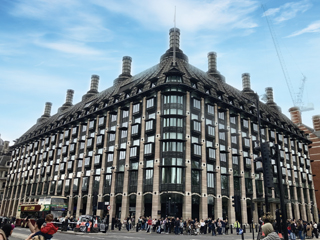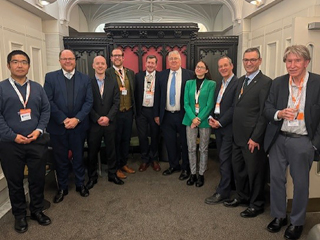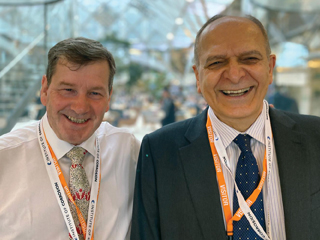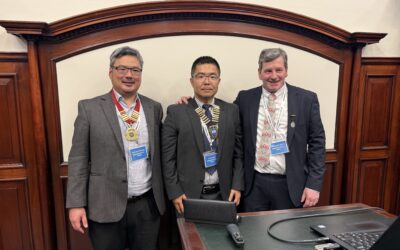Parliamentary and Scientific Committee
(P and SC) APPG – Special Joint ICorr/UK Government Event: Reuse, Renew or Replace?
Report by Sue Wharton, Science in Parliament (SIP) – The Journal of the Parliamentary and Scientific Committee (All-Party Parliamentary Group).
On 15th October 2024, visitors including eleven delegates from ICorr, were welcomed to the discussion meeting by George Freeman MP, new Chair of the P and SC.
The Parliamentary and Scientific Committee is an All-Party
Parliamentary Group funded by Membership – for further details go to
www.scienceinparliament.org.uk
Stephen Tate, President of ICorr, introduced Institute activities; training and informing corrosion engineers at all levels is a key objective. Courses are run, qualifications awarded, specialised meetings held, and financial support given, including for their Young Engineer Programme (YEP), currently running in London.
The APPG then heard four specialist presentations: Gareth Hinds, Senior Fellow and Science Area Leader, Electrochemistry Group at the National Physical Laboratory, gave us his thoughts on ‘Raising Awareness of Corrosion’; David Parker, Environmental Consultant, spoke on ‘The Potential of Value Retention Processes (VRPs)’; Izabela Gajewska, Intertek CAPCIS Consultancy Services, gave us her ideas on ‘Mentoring the Next Generation towards Corrosion Prevention’; and finally Christian Stone of Loughborough University and Concrete Preservation Technologies Ltd, described ‘Advanced Corrosion Management Techniques to Reduce Cost and Risk in Our Built Environment’.
Corrosion costs the UK £80 billion per year. Professor Hinds stressed we must raise awareness of this; we have expert knowledge of corrosion control practices, which could save up to 35% of this total. All countries pay the price of corrosion, and the World Corrosion Organisation (WCO), of which he is currently President, promotes global education and best practices in corrosion control; tackling corrosion also fits well with UN Sustainable Development Goals. Ideally, corrosion control should be incorporated in designs for new projects; unfortunately, undergraduate courses tend not to specialise in the subject, with knowledge generally learnt on the job.
David Parker focused on re-use, explaining the concept of Value Retention Processes (VRPs), Refurbishment and repair, re-use, and remanufacturing were reviewed. Benefits from re-use include reduced emissions, saving raw materials, and more skill orientated jobs. Industry and services are aware of benefits but hampered by regulatory and trade barriers and cost pressures.
Izabela Gajewska, Intertek CAPCIS Consultancy Services, and an ICorr Young Engineer, gave us her views on developing the new generation of corrosion engineers.
Optimised corrosion prevention practices can improve safety, protect the environment, and save money. She listed the varied work of corrosion professionals, reiterated the shortage of new engineers, and suggested suitable courses; experienced specialists retiring impacts the transfer of knowledge. Better communication on education, training, and mentoring would enable and encourage more homegrown students. Christian Stone described advanced corrosion management techniques. Much of our built environment uses reinforced concrete, but mid-20th century public infrastructure can now require intervention; current repair strategies are often lacking and work delayed due to budget constraints. Refurbishment of existing structures is better than rebuilding. Britain is a world leader in corrosion surveying and management; electrochemical surveys pinpoint issues and tailor them to specific locations. Hybrid Galvanic techniques are UK inventions, used worldwide. Recent Reinforced Aerated Autoclave Concrete (RAAC) concerns have been tackled using specific survey methods and anodes, now protecting many public buildings.
A varied Q and A session discussed RAAC safety, reluctance to use new technology, and shortage of specialist engineers. Reactive attitudes persist; only when a collapse occurs do organisations have to rethink. Better communication and design are needed; short-termism is a false economy.
A national register of structures at risk in all areas is considered desirable. Corrosion engineers can play an important role in sustainability and climate change; there should be more awareness of the value of their skills.
The Institute of Corrosion expresses its special thanks for assistance provided to ICorr by Karen Smith, Leigh Jeffes, Roger Brown and Sue Wharton of the Science in Parliament (SIP) Group.

Photo: P and SC Portcullis House, London. Image Courtesy of Parliamentary and Scientific Committee APPG.

Photo: L-R Yunnan Gao (ICorr Vice President), George Freeman MP (Past Minister of State in the Department for Science, Innovation and Technology), Gareth Hinds (Past ICorr President/Speaker), Christian Stone (ICorr Speaker), Stephen Tate (ICorr President/Speaker), Stephen Benn (3rd Viscount Stansgate), Izabela Gajewska (ICorr Speaker), David Parker (ICorr Speaker), David Mobbs (Coatings Specialist) and Douglas Mills (Past ICorr Technical Secretary). Image Courtesy of Parliamentary and Scientific Committee APPG.

Photo: ICorr President Stephen Tate with ICorr MIC Tutor Tony Rizk. Image Courtesy of Parliamentary and Scientific Committee APPG.



